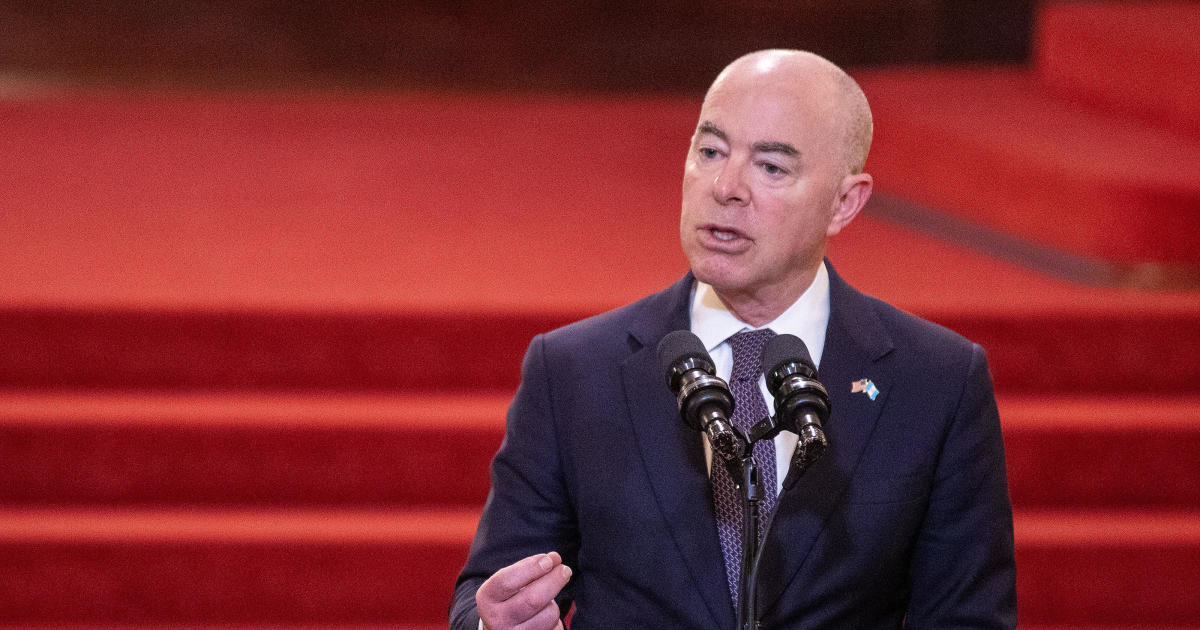“We do not consider concertina wire to be effective. It impairs Customs and Border Protection’s ability to do its job, and we’re also seeing migrants rather easily cutting concertina wire,” Mayorkas told a group of reporters who attended a roundtable on Friday at Homeland Security (DHS) headquarters in Washington.
As part of a broader, multi-billion-dollar campaign known as Operation Lone Star, Abbott has instructed state National Guard troops to put up concertina and razor wire, as well as other barriers, along parts of Texas’ border with Mexico. The wire is currently at the center of an ongoing legal battle in federal court between Texas and the U.S. Justice Department.
Abbott argues that the barriers deter migrants from crossing into his state illegally and has credited them for a marked drop in illegal crossings along the Texas border since last year. More broadly, he has claimed that Texas’ actions, which also include arrests of migrants on trespassing charges, are responsible for pushing migrant crossings into Arizona and California in recent months.
But Mayorkas disputed Abbott’s claim on Friday, noting that some stretches of the Texas-Mexico border were fortified with razor wire late last year, when migrant crossings were soaring to record levels, including in the Texas border town of Eagle Pass.
“I know that Governor Abbott of Texas has taken credit for a reduction in the number of encounters and I would posit that the tools that he has employed — and I’m not commenting on their lawfulness or legal shortcomings, that is obviously the subject of litigation in court — but the tools that he has employed were in effect in December, and they were in effect in January,” Mayorkas said.
“And so to attribute the significant drop in the number of encounters to anything he has done, I would say is belied by the facts,” Mayorkas added.
Representatives for Abbott did not immediately respond to requests for comment on Mayorkas’ remarks.
During Abbott’s tenure, Texas has mounted the most aggressive state effort in modern history to challenge the federal government’s long-standing power to set border and immigration policy.
In addition to the trespassing arrests and the deployment of barriers and National Guard troops, Texas has bused tens of thousands of migrants to Democratic-led cities, without notifying local authorities. In January, the Texas National Guard commandeered a public park in Eagle Pass and has since blocked federal Border Patrol agents from processing migrants there.
Texas has also sought to implement one of the toughest state immigration laws in U.S. history. The measure, known as SB4, would empower Texas officials to arrest and jail migrants on misdemeanor or felony charges if they are suspected of crossing in the U.S. without authorization and to order them to return to Mexico. The law is currently paused while a federal appeals court determines its legality.
Mayorkas said he couldn’t say much about SB4 because of the ongoing court case. But he noted that “it is the federal government’s position that immigration policy is the exclusive province of the federal government.”
Mayorkas accused Texas of trying to create disorder through its border efforts.
“We think that responsible governance requires people in positions of authority to communicate, coordinate and collaborate with one another, and the deliberate refusal to do so, in an effort to sow chaos, is not responsible governance,” he said.
Mayorkas, who came to the U.S. as a child refugee from Cuba, has found himself at the center of the nation’s contentious debate over immigration policy. It’s a debate that has intensified in recent years because of record levels of migrant apprehensions reported along the southern border since President Biden took office.
Earlier this year, the Republican-led House of Representatives impeached Mayorkas on charges that he breached the public’s trust and failed to fully enforce U.S. immigration laws, making him the first cabinet secretary to be impeached since the 1870s. Mayorkas has not been accused of personal misconduct and Democrats have said Republicans impeached him solely based on immigration policy differences.
The House impeachment managers are expected to deliver the articles of impeachment to the Democratic-led Senate on Wednesday, when Mayorkas is also set to testify before two congressional committees for funding hearings.
On Friday, Mayorkas reiterated that he remains focused on his day job and said he hasn’t thought about whether he’d prefer that the Senate hold a trial or quickly dismiss the impeachment articles.
“When I say that I am not focused on the impeachment proceedings, I actually mean it,” Mayorkas said. “I will say this, that it is my hope that my time is not taken away from my work.”

